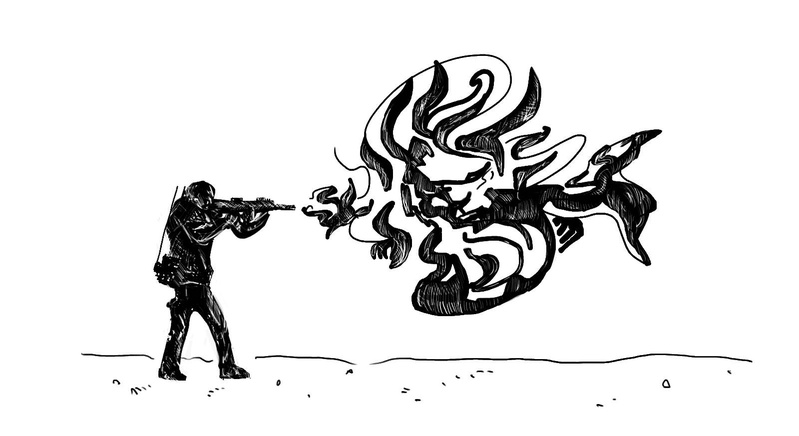Dear 1st Lieutenant Thompson,
By now, you've already learned just about everything the Marine Corps has to teach about leadership, and you've applied much of it. Don't wander away from that, or that ethos that defined you as being proud to claim the title "Marine."
You know right from wrong. Endeavor to do right. You won't always do it, but endeavor nonetheless. It will serve you well when you find yourself surrounded by people and circumstances in which "integrity" is a foreign word.
You possess an overabundance of confidence and an acute lack of patience, and you see the world in black and white, right or wrong. You're hardheaded and opinionated and, above all, convinced of your ability to accomplish anything you set out to do. But -- and this may sound like a prophecy of doom to someone like you -- you're going to fail. Often. Sometimes spectacularly.
You’ll screw up the schedule of a three-star general, causing every subsequent unit on the schedule to make massive adjustments to accommodate the delay. What had been, up until that moment, the flawless execution of a complicated travel schedule involving multiple visits in multiple countries turned into an embarrassing disaster in minutes. It also took three days to get the remainder of the schedule completely untangled, all under the angry glare of the general.
Sometimes you’ll fail in the quiet privacy of your own mind. When you fail to qualify as an expert on the rifle range, it won’t matter that you weren’t the only one who failed, nor that the wind and cold played havoc on all the shooters that day. You will feel you failed because you hadn’t achieved the goal you'd set for yourself as a leader. You should know this about failing: it doesn't make you a failure. It just makes you look for another way to succeed.
One thing you haven't learned yet is fear and its effects on you, your men and your decisions. Even before your first night in combat, you’d already had some scares. You’d pulled people from cars after grisly wrecks. You’d had a gun pulled on you in a parking lot in Panama City, Florida. You’d seen a man nearly bleed out from a slashed wrist before you could get a tourniquet on his arm.
But nothing will compare to the nearly all-consuming terror of going into combat. As an officer and a leader, your responsibility will be only to accomplish your mission, but also to keep your Marines focused, motivated, and calm. You’ll rely on your training and put your own fears aside a minute at a time.
You'll force yourself to not think about the incoming rounds or stepping on a mine or whether you can get your gas mask on in time. You won’t allow yourself to let that nagging dread, that screaming instinct to protect yourself, to take hold, not for a second. You know it will paralyze you. And if that happens, the men in your care will be in jeopardy.
Fear is sometimes the companion of failure, sometimes its cause, and sometimes its result. Accept it, and accept two realities: first, it's OK to be afraid. Deep inside that fear is the true measure of yourself as a man, as a Marine, and as a leader. Being afraid in combat doesn't make you weak, it just makes you human.
What you do in the face of that fear is the thing that matters. It's an old saying, but old sayings have a way of being true: courage is not the absence of fear; courage is being able to take action in spite of your fear.
And you'll learn to dance with it, because very, very few of us ever conquer our fear. Most of us learn to deal with it and carry on. So will you, and you'll learn to control it. As a leader, you must. Never let the troops see your fear, but let them know you understand theirs. Care about them. Respect them. Know their girlfriend’s name, where they’re from, what football team they pull for. Don’t let their fear gain a foothold in them.
There are other things to learn that aren’t found in a manual. Learn how to forgive. Learn that forgiveness is a process, not a one-time bestowment. With yourself as well as others. The world is NOT black and white, at least for those of us not living in denial. Yes, some things are more easily discernible than others (loyalty, honor, respect), but, for the most part, the world and the decisions you make in it -- big and small -- require far more nuance than you think. Feel with your heart, but decide with your head.
Don't listen to the bullshit about needing to know today where you want to be 10, 20, 30 years from now. You're not a soothsayer. Embrace the journey, and don't sell yourself short along the way. Open your mind, allow yourself to evolve, and be who you are, not who (or what) someone else wants you to be. You're already starting to feel your passion for writing. You're going to decide to leave the Marine Corps, then decide to stay in, then fail in a way that brings your time in the Corps to an end.
You're going to follow that passion, and you're going to have some success -- you're going to write books, speeches for senators and the Secretary of the Army. But it's going to put you at odds with those black-and-white opinions you hold today. And you're going to learn to embrace that. It's called growth. Stoke that fire, that passion you're feeling now as a writer, and keep it burning every day of your life.
Finally: ALWAYS DOUBLE-CHECK THE NUMBERS.


